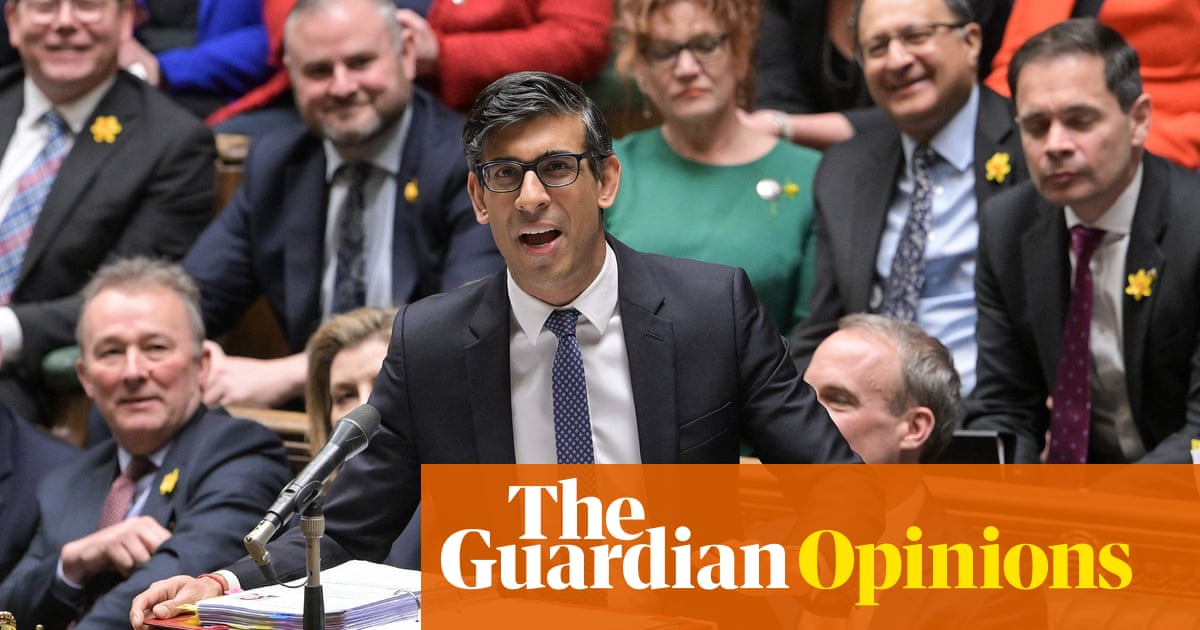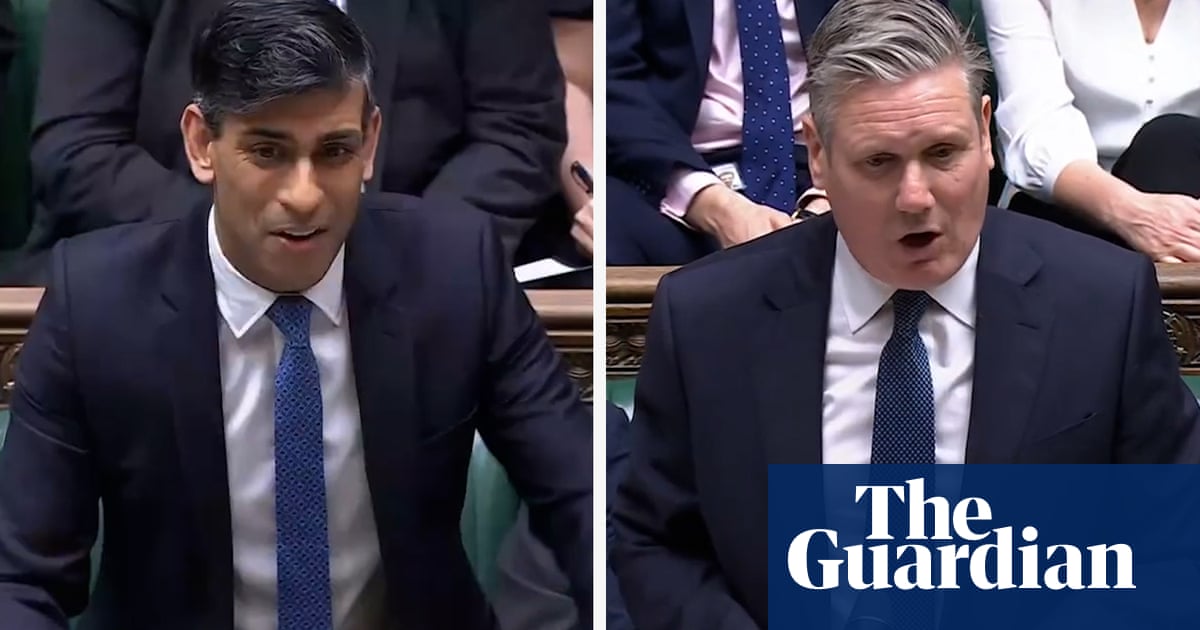
Britain’s leaders have been warned against a “politically suicidal” lurch away from their green pledges as concerns grow that both major parties may dilute their plans to combat the climate crisis in the wake of a shock byelection result.
Senior figures from business, the scientific community and across the political divide warned that any watering down of climate policies would be deeply unpopular with voters, set back the international fight to reach net zero and damage Britain’s green reputation.
There are fears that both Rishi Sunak and Keir Starmer will loosen their support for such policies after the Conservatives’ surprise win in the Uxbridge and South Ruislip byelection on Thursday. The Tories narrowly won the seat, by just 495 votes, with a campaign that capitalised on opposition to plans by London’s Labour mayor Sadiq Khan to extend the ultra low emission zone (Ulez).
Sunak is already being urged by the right of the party and some of his own cabinet to rethink his commitment to green policies in the light of the Uxbridge result. Meanwhile, a senior Labour MP warned that Starmer risked “allowing the Tories to edit the next Labour manifesto” over climate change. The Labour leader had said the Uxbridge result showed the party must not adopt policies that could be featured on Tory election leaflets.
There is a concerted effort this weekend to ensure that the political unity over Britain’s net zero aims remains in place. Alok Sharma, a former Tory cabinet minister and president of Cop26, said it was vital that all parties maintained the political consensus on pursuing net zero.
“We have built up a broad political consensus in the UK on pursuit of net zero policies which are good for the economy, jobs, exports and the environment. Businesses support this agenda because they can see the economic benefits, he told the Observer. “And the independent Office for Budget Responsibility has noted that unmitigated climate change would ultimately have catastrophic economic and fiscal consequences for the UK.
“Concerns about the environment and climate change also consistently rank among the top issues of importance for voters. Given the economic, environmental and electoral case for climate action, it would be self-defeating for any political party to seek to break the political consensus on this vital agenda,” Sharma warned.
Zac Goldsmith, the former minister who quit the government over what he described as Sunak’s lack of interest in the environment, said that any party rethinking its commitment to the climate would be punished. “Byelection results can be interpreted in countless ways, and it is the nature of politicians and political commentators to wedge their own prejudices into the outcomes,” he told the Observer. “But to use these recent results to advocate abandonment of the UK’s previous environmental leadership is cynical and idiotic.
“It would also be politically suicidal, given the very deep and wide support for action on the environment that exists right across the electorate. And it is immoral, given that both government and opposition acknowledge the gravity of the crisis we face.
“So it’s hard to believe there really are people at the top of either of the main parties calling for abandonment of green policies, but if there are, I can only hope they are hammered by the electorate when the time comes,” said Goldsmith, who had been minister for the international environment and climate before he stepped down from the Foreign Office.
Professor Nicholas Stern, who led a seminal 2006 review on the economics of climate change, also issued a plea for leadership on the climate. “Air pollution kills tens of thousands in the UK each year – far more than deaths in road traffic accidents – and millions around the world,” he said.
“Inaction is not a sane option for us, our children and grandchildren. Second, the costs of investments in the transition away from fossil fuels are significantly increased by policy risk due to politicians chopping and changing their views and actions.
“Third, the investment costs of the transition need to be distributed fairly. And fourth, the UK’s reputation in the world depends on its leadership on these issues. Our standing has already been damaged by the loss of focus since we hosted the United Nations climate change summit in Glasgow in 2021.”
The latest Opinium poll for the Observer highlights the perilous state the Tories are in as MPs headed to their constituencies for Westminster’s summer recess. Labour has a 17-point lead. The party retains a 42% share of the vote, with the Tories on just 25%.
Sunak’s team are desperately searching for ways to reverse the party’s fortunes. As well as calls to back away from green measures, the prime minister is also said to be looking at a campaign that would vow to “protect” voters from Labour policies. Sunak’s government already appears to have watered down and delayed an end to the effective ban on more onshore wind farms put in place by David Cameron.
Nathan Bennett, head of strategic communications at RenewableUK, the renewable energy trade association, said that now was precisely the wrong time to be “watering down ambition” and for false arguments to be developing about the costs of greening the economy. “I am concerned about a false narrative emerging that green policies are unpopular and costly, as that’s certainly not the case for renewables and many other clean technologies,” he said.
“New wind farms are driving down energy bills, and polls consistently show that, if anything, people want us to roll out more renewables than we currently are, including new onshore wind.”
Greg Jackson, chief executive of Octopus Energy, the renewable energy group, said there was now a risk that the UK would lose out to other countries in the race for investment: “Harnessing the opportunities of net zero to deliver tangible financial benefits is extremely popular. Our customers love getting cheap energy when it’s windy, or being paid to use less when it’s not. Britain has had a lead in cheap, clean energy, but like so many industries of the past, we risk other countries getting the benefit of our innovation – costly for climate, cost of living and national security.”
Starmer raised concerns within the party by extending his criticism of the Ulez. “We are doing something very wrong if policies put forward by the Labour party end up on each and every Tory leaflet,” he told Labour’s national policy forum in Nottingham. It marks an escalation of his confrontation with Khan over the Ulez extension. In a change in tone, a source close to Khan said on Friday he was “listening to Londoners and always looking at ways he can address their concerns”.
Former shadow chancellor John McDonnell told the Observer: “Of course potential policy banana skins have to be avoided, but if we are not careful, effectively this means allowing the Tories to edit the next Labour manifesto on the greatest issue facing us, the climate crisis.”












